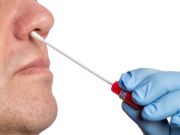
SATURDAY, Oct. 3, 2020 (HealthDay News) — President Donald Trump was being treated for coronavirus infection at Walter Reed National Military Medical Center on Saturday, after announcing that he had tested positive for COVID-19 early Friday morning. Trump is struggling with a fever, a cough and nasal congestion, among other symptoms, two officials familiar with… read on >




























